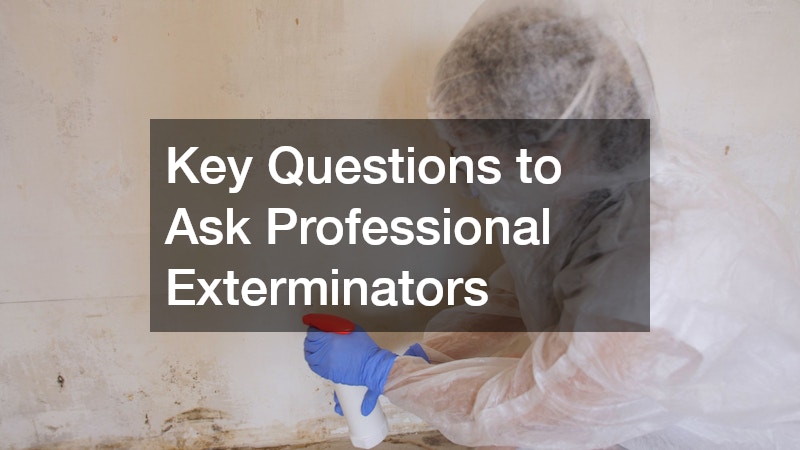When pests threaten health, inventory, or peace of mind, hiring a qualified team matters more than a quick spray. The right questions help you separate short-term fixes from durable solutions and ensure the work is safe for people, pets, and property. Before you sign a contract, use the checklist below to evaluate professional exterminators on knowledge, transparency, and long-term prevention.
What Licenses, Insurance, and Certifications Do You Hold?
Start with credentials. Ask for the company’s state license number, proof of general liability coverage, and workers’ compensation information.
If the firm carries advanced certifications (such as quality-pro standards or specialty training for termites, bed bugs, or wildlife), request documentation and confirm that the technician assigned to your site holds them—not just the owner. Proper credentials protect you from liability and indicate the team follows regulated best practices.
How Will You Inspect and Identify the Problem?
Accurate identification drives effective treatment. A thorough provider will perform an interior and exterior inspection, look for entry points, and document conducive conditions like moisture, clutter, or landscaping that touches structures. Ask how they confirm species (visual signs, traps, monitors, or lab analysis) and how they’ll measure the scope of activity. Insist on a written inspection report with photos, a sketch of problem zones, and an explanation of how the proposed plan targets the specific pest lifecycle.
Which Treatment Options Are Available, and Why This One?
There is rarely a single “right” method. Request alternatives—chemical, mechanical, and exclusion—and discuss pros and cons for each. A knowledgeable team can explain active ingredients, target sites, and expected timelines in plain language. When exterminators propose pesticide applications, ask about concentration, application method, and any label restrictions. Clarify re-entry times for people and pets, and whether sensitive environments (nurseries, kitchens, medical spaces) require different products or scheduling.
How Do You Prioritize Safety and Compliance?
Safety should be visible in their process. Ask whether they follow integrated pest management (IPM), which emphasizes sanitation, sealing, habitat changes, and low-risk controls before chemicals. Confirm that technicians use PPE, that products are EPA-registered, and that applications comply with label directions and local rules. Request Safety Data Sheets (SDS) in advance, and ask how they minimize drift, protect waterways, and prevent exposure for children, older adults, and animals.
What Is Included in Pricing—and What Is Not?
Transparent pricing prevents surprises. Make sure the estimate itemizes inspection, treatment, follow-up visits, sealing or exclusion work, and any specialty equipment (heat, fumigation tents, or rodent-proofing materials). Ask if re-treatments are included within a time window and whether callbacks are free or discounted. Reputable exterminators will explain deposit terms, cancellation policies, and factors that could change the price—such as discovering hidden access points or structural repairs outside their scope.
Do You Guarantee Results, and How Are Callbacks Handled?
Guarantees vary by pest and method. Termites, for example, often carry multi-year warranties tied to annual inspections, while bed bugs may require several visits with strict preparation. Ask what conditions void coverage (e.g., failure to reduce clutter or fix leaks) and how fast the company responds to a callback. A meaningful guarantee sets realistic expectations, defines success metrics, and specifies whether refunds or alternative treatments are available if results fall short.
What Preparation Do You Require from Us?
Preparation affects results more than most people expect. Ask for a written prep checklist tailored to your site: laundering and bagging textiles, decluttering baseboards, moving appliances, trimming vegetation, repairing screens, or storing food. The company should also list what you should not do—such as applying over-the-counter sprays that can repel pests and scatter infestations. Clear prep saves time, reduces chemical use, and improves the odds of first-pass success.
How Will You Prevent Future Infestations?
Treatment without prevention becomes a revolving door. Expect recommendations for sealing gaps, installing door sweeps, repairing vents, managing trash, and adjusting irrigation or drainage. For rodents or wildlife, ask about exclusion grades (mesh sizes, chew-resistant materials), and for flying insects, discuss lighting and screening strategies. The provider should measure progress with monitors, log pest pressure over time, and adjust tactics seasonally—not just sell a one-size plan.
Effective pest control is a partnership built on clear goals, careful inspection, and smart prevention—not just a single spray. By asking focused questions about credentials, methods, safety, pricing, preparation, and proof of results, you set up a program that actually reduces risk and stays within budget. Choose a team that explains options, documents every visit, and commits to prevention as much as treatment; that combination will keep your property healthier, safer, and pest-free over the long term.

